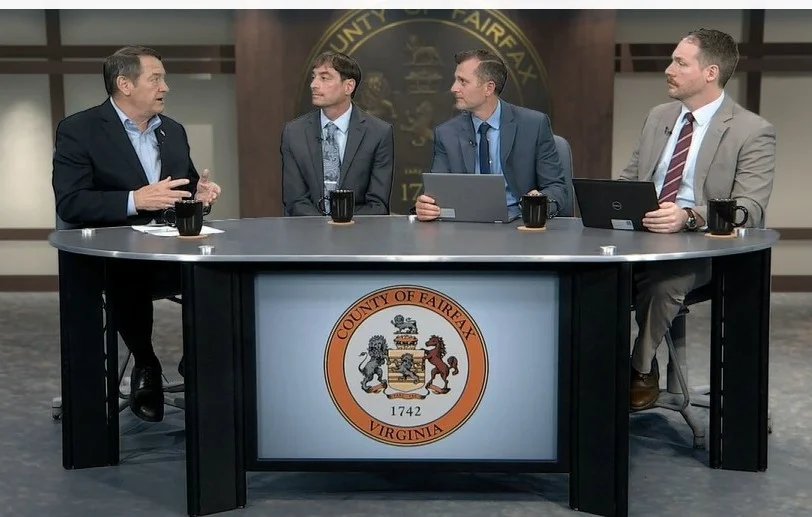Residents express concerns about a Unified Sanitation District

Residents raised lots of concerns about a proposed Unified Sanitation District at a virtual town hall convened by Fairfax County Supervisor Pat Herrity (Springfield) on June 3.
The Board of Supervisors scheduled a hearing on the proposal for June 24.
The concept calls for the county to take over trash and recycling collections for all single-family homes. Instead of the current situation, where multiple private haulers collect trash within a community, the county would contract with a company to handle waste collection in a particular region.
Details have not been determined on how many regions there would be, the cost to homeowners, the services provided, and to what extent homeowners could opt out.
Some of the concerns raised at the town hall dealt with the prospect of small trash haulers being forced out of business, whether homeowner associations could be excluded, and residents’ lack of choice in deciding what services they want.
A five-year waiting period
Herrity said he voted against scheduling a hearing on a Unified Sanitation District (USD) because there hasn’t been enough outreach to the public and to private waste haulers.
He said during the pandemic in 2020-22, there were lots of complaints about rising costs and deteriorating service, but “now, we’re not experiencing significant complaints.”
If a USD is approved by the Board of Supervisors, Virginia law requires a five-year waiting period before it could be implemented.
Fairfax County currently provides trash and recycling services to about 10 percent of residents, most of them in Mason District.
Related story: BoS authorizes a hearing on a Unified Sanitary District
The driving force for converting to a USD is to help the county meet its goals for environmental sustainability, said Chris Herrington, director of the Fairfax County Department of Public Works and Environmental Services. Currently, the county doesn’t have the authority to limit the number of private haulers in a neighborhood or regulate the price for trash collection.
If a USD is implemented, the county would collect trash, recycling, and yard waste and would have the option to also collect food scraps for recycling and bulk items, Herrington said.
There would probably be variable pricing based on volume, with higher prices for customers with larger bins.
Zero waste fees
According to Herrington, residents would be charged a “zero waste fee” to pay for the service. The USD would not be funded through property taxes. He estimated the fee would be $12 a year per household to create a funding stream to start the planning process.
If the Board of Supervisors votes to go ahead with a USD, the zero waste fee would most likely be implemented in 2027 to cover start-up costs and hire at least 24 new employees. The fee could also cover additional services such as pop-up zero waste recycling centers where residents could drop off organic materials or electronic items.
Herrington said the county will need to hire more people to administer the program, enforce provisions in the contracts with trash companies, and educate people on how to navigate the new system.
“We think the cost would be lower for the average customer compared to what is provided today,” he said. That’s because the county would be able to negotiate with contractors in bulk through a competitive process.
Small trash haulers impacted
Herrity worried that if a USD is approved, small trash collection companies would be shut down. They would likely reduce their service and stop investing in innovations during the five-year waiting period, as they wouldn’t expect to win contracts with the county. Instead of creating a USD, he suggested incentivizing haulers to implement zero waste strategies.
He also noted that residents would no longer have the option of saving money by taking their trash to a landfill.
In response to a question about whether there would be different prices for rural areas where homes are spread out than more urbanized communities, Herrington said the county prefers a standardized price, but that hasn’t been determined.
A resident in a community with a homeowner association said HOAs should be allowed to opt out. “Trash collection is built into the HOA’s governing documents,” he said. “Changing that would be a fundamental problem.”
“We haven’t decided how we would manage opt-outs or how to divide the county into service areas,” Herrington said.
A lack of choice
Another resident said a USD would eliminate choice, noting that some people want trash picked up twice a week; others are okay with once a week. Some people want their leaves picked up, and others don’t. Some people have big families and pets, while retired people have less trash.
“We totally recognize there’s a diversity of need,” Herrington said. He suggested the possibility of providing discounts to seniors and vulnerable citizens.
Another person suggested the county should encourage people to compost their organic material rather than move it from one part of the county to another. Herrington agreed that it’s better for people to do their own composting, but that wouldn’t happen on a large enough scale.
Trash haulers always start with good services, but then their trucks break down or there are other problems, someone else said. “It took us 25 years to find a responsible company. Why would we want to give that up?”


I agree with these concerns.
Of greater concern is the additional burden on the taxpayers to fund ever more government “workers” leading to inevitable poor service and corruption.